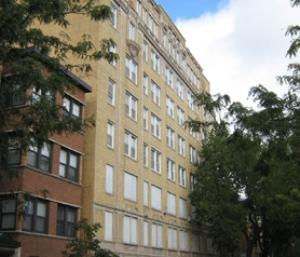Drug War Issues
Politics & Advocacy
The Chicago Housing Authority wants to require all current and future adult residents -- including senior citizens -- to pass a drug test. A positive drug test would result in an eviction notice for the resident.

The CHA wants you to pass a drug test if you live in the Kenmore or any other CHA properties. (Image courtesy CHA)
The American Civil Liberties Union accused the CHA of subjecting the poor to a double standard, while resident leaders said the proposal was humiliating.
"The ACLU opposes drug testing in the absence of suspicion as a condition of residency in public housing," senior lawyer Adam Schwartz told the Chicago Sun-Times. "From our perspective, drug testing without suspicion is humiliating. It's stigmatizing. There's a double standard here," he said. "All across our city and our country, when most of us who are in whatever income bracket rent housing, we don't have to take a drug test. This is an emerging one standard for poor people and another standard for everyone else."
"Singling us out for this type of humiliation is a slap in the face of what this whole 'Plan for Transformation' supposedly is about," Myra King, chair of the central advisory council of tenant leaders for all CHA housing in the city, told the Sun-Times. "CHA says they're doing this plan to make us privy to the same standards as any other citizen in any other community. If that's true, why are we the only citizens to be drug tested?"
Lewis's "Plan for Transformation" also includes eliminating the "innocent tenant defense," which allows residents whose relatives or guests committed a drug offense or crime of violence to avoid eviction if they can show they were unaware of the activity. In a 2002 case, the US Supreme Court ruled that housing authorities could evict innocent tenants, but they are not required to. Former CHA head Terry Peterson had reached an agreement with tenants that allowed the continued use of the defense if it could be proved in court.
Spokeswoman Kellie O'Connell-Miller defended the proposals, pointing out that several CHA mixed-income properties currently require drug testing. "These are policies to help strengthen and improve the safety of our public housing communities," O'Connell-Miller said. "We're constantly hearing from law-abiding residents that they want us to hold the non-law abiding residents more accountable. We're trying to tighten up our lease with some of these issues. Drug dealers won't come where there are no buyers. If you remove the folks who are interested in drugs, hopefully it will remove some of the problems," she said.
Making the policy system wide would apply it to some 16,000 families living in family and senior public housing. The CHA has not estimated the cost of the proposal, O'Connell-Miller said.
The proposals are open to public comment through June 16, with a public hearing set for Thursday. If the proposal is adopted, it must then be approved by the CHA Board and then the federal Department of Housing and Urban Development.
And then the CHA can spend good money fighting (and most likely losing), the inevitable legal challenges. The precedent here is the state of Michigan's 1990s law mandating the suspicionless drug testing of welfare recipients. It was rejected by the federal courts in 2003 for violating Fourth Amendment proscriptions against unreasonable search and seizure.
This work by StoptheDrugWar.org is licensed under Creative Commons Attribution-ShareAlike 4.0 International
Comments
Chicago and Florida better be
Chicago and Florida better be ready to explain to their people in the next year or so why their budgets have continued to go down hill, While they are spending hundreds and thousands of dollars just to drug test every single person they possibly can. Then what? If someone tests positive and they are kicked out and become homeless, that is supposed to make the public safer? Not likely!!
Take everything you possibly can from someone and sooner or later they will become desperate enough to take everything they can get and do whatever is required to get it no matter how good the person was to begin with.
You can live in the projects as long as you're drunk...
...but not if your high and that's supposed to address public safety? We certainly need more accountability over hair-brained bureaucrats, starting with a study showing alcohol-related violence skyrocketing in the projects once the marijuana testing is implemented.
drug war
Ever notice who the " drug war " targets ? Who are these people that push a " drug war " onto the citizens of America ? Aren`t we having fun ?
Test for alcohol and tobacco too
Test for alcohol and tobacco too
Who will be next?
Oh, you want to buy gas?, pee in the cup. You want groceries?, pee. You want to ride the bus?, get in line. What happens when the homeless problem gets worse, more laws? In the USA we are presumed innocent UNTIL PROVEN GUILTY.
Tenant Drug Testing
CHA should have been conducting mandatory random drug testing of ALL tenants for the last decade. I own a single family home on a block with several Section 8 units. Nearly all of these units have gang/drug dealers living in them. The police respond to calls on a sporadic basis.
CHA should be held accountable for the tenants that it houses.
The Safety of others
I agree with drug testing. I live in senior housing. The drug addicts and pushers who live here causes hardship to the rest of the population. They steal,break-in and harass the others residents.
Add new comment